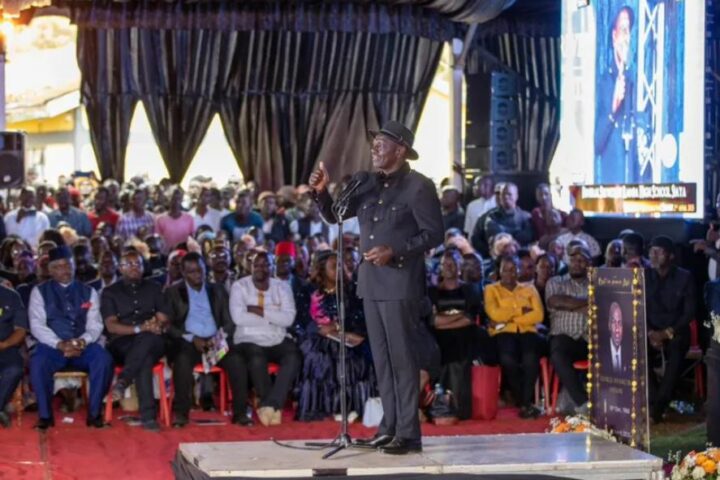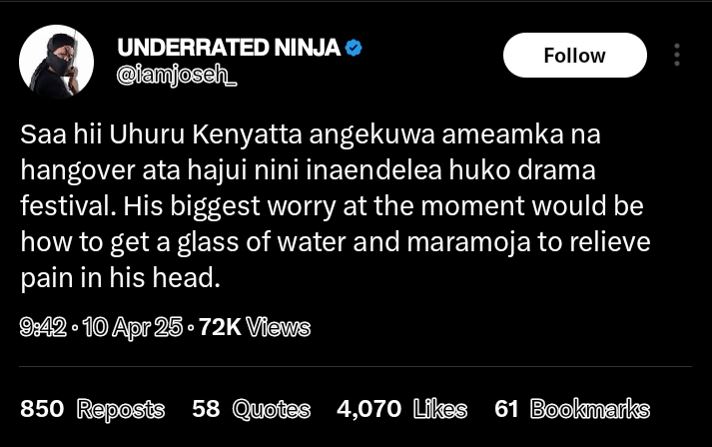 Renee Ngamau, who is an advocate of the High Court of Kenya, holds an LLM, Masters in Financial and Banking Law from the University of London.
Renee Ngamau, who is an advocate of the High Court of Kenya, holds an LLM, Masters in Financial and Banking Law from the University of London.
The former Capital FM radio host recently received the United Success Global Award Titled Women Moving Mountains for her work in protecting public land, especially playgrounds and open spaces.
She talked to the Nation about her career path.
Briefly tell us about yourself
I am an advocate of the High Court of Kenya, currently practicing in Kenya. I am a leadership and business coach. My focus is on helping women to start, grow, and pivot their businesses. I am a human rights activist. I volunteer with Amnesty International Kenya, where I currently serve as the chairperson to the Board of Amnesty International Kenya. Outside of that, I’m also a community leader within my community.
Tell us about your childhood and family life
I am the first of two children. My mother was widowed four years into getting married and was left with toddlers under the age of three. I was a very observant child and saw the hardships that my mother went through as a widow. My mother chose not to remarry or have a significant male in her life and this made her life very difficult.
I saw the discrimination that my mother went through at work, at home, the challenges she went through from her in-laws, challenges that persisted throughout her life, I saw the ways in which she was overlooked and often abused, attacked, and insulted in front of us by those who felt that she was in a position of inferiority. My mother fought really hard to maintain who she was and to raise us.
Educational Background
I am a child of different educational curriculums. I went to school in an American Mission School, did the 8-4-4 system, and went to school in Switzerland.
My first law degree was here at the University of Nairobi, Parklands campus. I have a master’s degree in banking and finance law from Queen Mary College, University of London. I have a diploma from the Kenya School of Law.
How has your career progressed over the years?
I started my career in business when I was still young where I would sell chapatis, sacks of potatoes, eggs, and keeping broilers, turkeys, and print t-shirts just to get pocket money.
I think that informs a lot about how I’ve seen my career, I see career as the thing, the work that you do, that is an expression of what it is that you would like to see more in the world.
I started off my very first position as a junior lawyer with a salary of Sh 30,000. This was an excellent salary and I had a company car to my name. I served as the alternate director to the chair of the Board of Directors at Total Kenya. Later on, I moved to the UK where I studied for a master’s degree and began my PhD degree. While I was doing my masters, I worked part-time as a paralegal manager.
While in the UK I trained as a results coach. This pivoted my career towards building my coaching practice in the UK. The other thing about me is I’m never scared to take a new challenge, which is exciting. Otherwise, I’d have never taken media and specifically radio.
So when I came back to Kenya, I did something really crazy, I joined media and worked for Capital FM as a morning show host.
I thought I would be working for six months and go back to law but I ended up staying on that show for five and a half years.
After Radio, I went back to practicing law and this year I decided to follow my heart and work towards raising, supporting coaching, training, mentoring 1 million women to confidently run successful businesses which can hire at least five other women and pay them the top salary scale within their countries.
What do you remember most about your career journey?
How I have always allowed myself to follow my heart and to do what it is that I want to. I didn’t always do this right from the start. But I’ve really learned to do this and to celebrate it.
What I also remember about my career journey is how transitioning from working in a law firm in Kenya to working in law firm in the UK showed the difference between what education and proper training can create in terms of classes of lawyers.
And this is not to say that we don’t have great lawyers in Kenya, we have absolutely fantastic lawyers in Kenya. But it was the quality of the relevance of the law, to be more innovative, to answer to the business questions of the day and to pivot to be more responsive to the market that I found so interesting and so different between the way law was practised Kenya and how it’s practiced in the UK.
What has been a key driver of your growth?
Hunger. I’m hungry and I don’t pretend that I am not ambitious. I don’t think that it’s a bad thing for a woman to be ambitious, I think it is a very good thing, we should want more, even while we celebrate what it is that we have, and what we have accomplished, we should want to go to the next rung.
I’m also very self-conscious and very aware. If I get to a place in my career, where it’s not serving me or not necessarily in my career because my career has always served me, or I’m at a place of work that does not serve me, that is toxic, or that is negative, I’m happy to let it go.
One of my greatest failures is for the first six months when I was in media, I used to trend for how bad I was. People would tease me about my accent. KOT can be vicious. I have never been a great entertainment person. I’m interested in the economy. I’m interested in politics, I’m interested in business, I’m interested in growth, achievement, development, human rights, this is what I’m interested in. And this is what I bring.
Also Read: After Living Here for 4 Years, I’m Convinced Kenyan Men Hate Their Women
Greatest moments in my career have been the awards and recognition that I’ve received over the year. Being a graduate of Michelle trust champion is one of my highest accolades. I celebrate a lot of those awards But I think also what I celebrate is what we’ve achieved, and what we continue to achieve.
Who can you single out that helped in your career growth and how did they influence your trajectory?
There are so many people, I don’t think that I would be able to name all of them but I can say right from the start I had the good fortune of having a number of very great opportunities and they shaped very many things about how I thought about law, being a lawyer, being a coach the contribution that I would make as a human being.
Total Kenya’s Momar Nguer was really pivotal in the sense that he took me under his wings, and mentored me in many ways on what was possible if I was to grow in the oil industry. And the ideas that he put in me sort of made me think I can grow anywhere in the world. I can redefine and pivot anywhere in the world.
I’ve always had the opportunity to meet women who further along the career path were willing to take me under their wings.
One such woman is the former CEO of the Petroleum Institute of East Africa Mary M’mukindia.
I also had the opportunity to live with and learn from Dr. Marcia Harris, an obstetrician-gynecologist in New York, who was the first African American OBY to ever have graduated out of New York University.
What are some key decisions you made in your career?
I’ve always chosen to put family first before career, and that has very often cost me career progression. When I had children, particularly my firstborn, I realised I didn’t want him to be raised by a nanny without me being present. I wanted to see his first steps, I wanted to be there for his first tooth, and my story is that it had been tough for me to bring a child to term. So, when I finally had a baby, I was committed to having that baby grow with his mother.
I also had to quit my job to take care of my mother who succumbed to breast cancer on April 12, 2020. I was her primary caregiver and it was difficult to work and care for her and a month before she passed on, I went home be with her.
What is your current role?
I am a trainer, moderator, and coach. I run my own company called ReneeSense limited. My mandate is to train, support, coach, and mentor 1 million women to run successful businesses to where they are paying at least five other women, the highest-level salary within the country. I run online courses and I run face to face courses and classes. Great intensives, very practical, very immersion-based intensives.
As the chairperson of Amnesty International Kenya, my role is to do the kind of strategic thinking and implementation that will help Amnesty International Kenya to grow and therefore the movement to grow.
Everyone should be an Amnesty International Kenya member. So that is my role in so far as Amnesty International Kenya and serving on the board is concerned.
What would you tell your younger self?
I would say thank you because of all the choices that she made, some of which she may have thought were poor choices have led me to become who I am. And I wouldn’t be who I am. If she had not been who she is.
What would you advise the youth of Kenya?
The first round of choices that you’ve got to make is to choose to stand up, choose to speak out, choose to strategically place yourself in the positions of leadership, even in your youth, because you can take them over. Trust yourselves, the future belongs to you. And the future starts now.
Your future plans?
I’ve got to get to my goal of supporting, mentoring, coaching, and training 1 million women to confidently run successful businesses. I’m looking to continue to serve in whatever capacity I can whether or not I’m on the board within this human rights space and be part of the consciousness movement. I continue to fight for communal land everywhere within the country.






